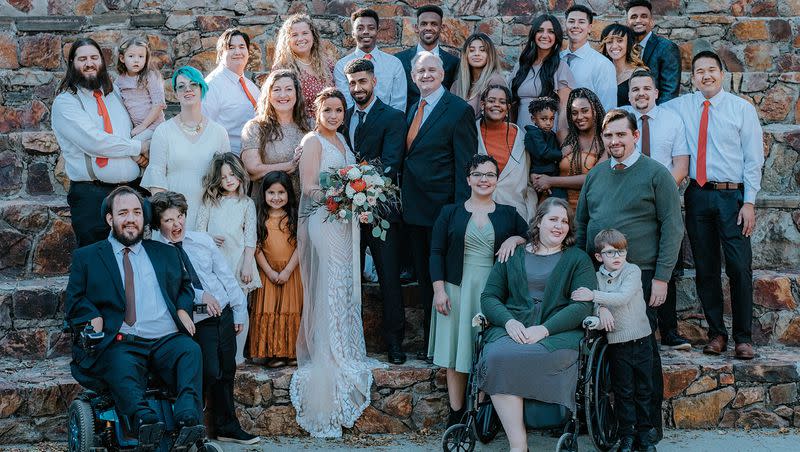Opinion: Father’s Day for the dad of a mega-family

“There was an overwhelming sense that I just wanted to do something to help. ... When you see something like that, cages on walls and firehoses for ‘bathing,’ I knew we just couldn’t turn away ... we couldn’t ignore it. We needed to do something to help.”
When I asked my husband, Greg, about his experience with our first adoption, and the impetus behind me getting on a plane and heading to Romania, this is what he told me. He remembered things that I did not. When he mentioned cages, I remembered that I had actually seen one, in one of the Romanian orphanages I was in. It was horrible.
I wrote about my family on Mother’s Day, our unique family of 25 children from eight different countries, of different races, ethnicities and abilities. When I thought about writing a piece for Father’s Day, I was asked if I knew what my husband thought about being the dad of such a large and uncommon family, or if I only thought I knew. Turns out, it was some of both. It was an interesting and quite emotional experience to interview someone I’ve been married to for more than 37 years. I highly recommend it.
Related
Answering questions
I asked Greg about the questions he gets asked most often, and they are different than the ones I most commonly get asked. The one he gets asked the very most is “How many?!” (25. The answer is 25.) He is also often asked, “How did you afford it?”
The answer, he says, is that the money was always there when we needed it. Often, we would get right up to the financial edge, and then money would come. We also need to note that many of our adoptions were less expensive than the average adoption today.
The two questions I get asked most often are first, “How do you cook for that many?!” and second, “How did you convince your husband to ‘let’ you adopt that many kids?”
First, with 20 children in our home at our peak, the answer was we cooked from scratch, we rarely ate out, we octupled recipes, and we used big pans.
The answer to the second question, though is that you don’t accidentally adopt. There is way too much paperwork. Greg answered this question for me as well. He told me that while I was almost always the first one to recognize that kids were missing from our family, he also got his own assurances. He had dreams, for example, of a massive tsunami headed our way, and he was unable to find all of our kids to get them to safety. When he shared those dreams with me at the time, I told him basically, “I know — they’re missing from our family, and we need to go get them.”
Differences
It might be obvious, but we have different ways of parenting. Greg told me that he watched love pour out of me in a way that was not only visceral but almost visible. For him, with a full-time job away from home, he had different ways of interacting with the kids: wrestling around, working on jigsaw puzzles together, home improvement, home repair and car repair projects.
We powered through the sheer logistics of it all — feeding, clothing, getting kids to school on time, helping with homework, going to kids’ events. It was a lot.
“Looking back, I don’t know how we did it,” he said, but we did. Ralph Waldo Emerson said, “That which we persist in doing becomes easier to do, not that the nature of the thing has changed but that our power to do has increased.” That and a whole lot of prayer.
We are also different in how we grieve, whether that’s an unexpected diagnosis, more significant challenges or the grief of burying our daughters. We have lost six. Greg says the grief of dealing with the death of our daughters hit him like a tidal wave.
“I can’t put it in a box. It’s too big.” Then he was out the other side.
For me, going straight into that overwhelming amount of grief would have killed me. Rather than diving into a metaphorical tidal wave, I grieve more slowly, in small bits that I can handle. When our daughter Angelia died, I cried every day for two years. One thing we both have in common, though, is that we have been deliberate in supporting each other in our different ways of grieving.
Advice
“Parenting is like the ‘Forrest Gump’ quote: ‘Life is like a box of chocolates, you never know what you’re going to get.’” Greg’s advice to other fathers is to know going in that every child is different. There is no manual, and if there were, it would change with the next child. There will be many opportunities for you, as a parent, to learn and to grow — and parenting lasts forever, even when your own children have children. He believes that our role as parents is to love our children, even when they make choices we might not have made, and that we are always works in progress.
Finally, I asked him if he would do it all again.
“Absolutely,” he said. “Even with all the challenges we’ve faced, I would absolutely choose each child again.”
